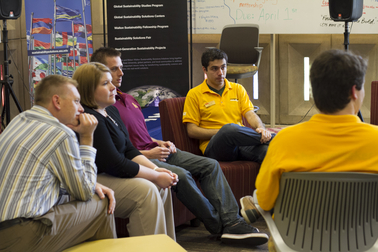Letter from the Dean
March 28, 2013
 Dear colleagues, staff, and students,
Dear colleagues, staff, and students,
On June 30, 2013, I will be stepping down, at my own request, as dean of Arizona State University’s School of Sustainability (the School).
I will continue as Foundation Professor with tenure in ASU’s School of Human Evolution and Social Change (SHESC) and a half-time appointment in both SHESC and the School. I will have the pleasure to keep my responsibility as co-director of CAS@ASU (the new name of the Complex Adaptive Systems Initiative), as well as for the development of ASU’s Center for Integrated Solutions to Climate Challenges.
This is, for me, a liberating step. After ten years of administrative duties at ASU, I see my remaining years in academia melting like snow under the Arizona sun. I want to return to a more normal academic life of teaching, writing, thinking strategically about the scientific domains I am involved in, and strengthening ties with colleagues all over the world with whom I enjoy working.


 Britain’s Sir Crispin Tickell will be visiting Arizona State University to discuss “The Human Future” on Thursday, April 11, from 6:00-7:30 p.m. at the Tempe Center for the Arts in the Lakeside Room.
Britain’s Sir Crispin Tickell will be visiting Arizona State University to discuss “The Human Future” on Thursday, April 11, from 6:00-7:30 p.m. at the Tempe Center for the Arts in the Lakeside Room.

 ASU's first
ASU's first  University gymnast Kahoku Palafox recently graduated magna cum laude with a degree in sustainability from Arizona State University's School of Sustainability. She submitted a case study to the Green Sports Alliance that outlined Sun Devil Athletics’ sustainability and conservation practices. Palafox explained the processes behind making ASU's sports events sustainable, like zero-waste practices and energy conservation.
University gymnast Kahoku Palafox recently graduated magna cum laude with a degree in sustainability from Arizona State University's School of Sustainability. She submitted a case study to the Green Sports Alliance that outlined Sun Devil Athletics’ sustainability and conservation practices. Palafox explained the processes behind making ASU's sports events sustainable, like zero-waste practices and energy conservation.


 A team of researchers from Arizona State University, Stanford University, and the Carnegie Institution for Science has found that future sugar cane plantations can help Brazil increase its ethanol production, while also decreasing regional temperature.
A team of researchers from Arizona State University, Stanford University, and the Carnegie Institution for Science has found that future sugar cane plantations can help Brazil increase its ethanol production, while also decreasing regional temperature.
 The Sustainability Initiatives Revolving Fund (SIRF) annual report highlights a dozen energy-reduction projects at ASU that were supported by SIRF funds during FY2012.
The Sustainability Initiatives Revolving Fund (SIRF) annual report highlights a dozen energy-reduction projects at ASU that were supported by SIRF funds during FY2012.

 The U.S. Environmental Protection Agency (EPA) recognized Arizona State University’s
The U.S. Environmental Protection Agency (EPA) recognized Arizona State University’s 
 Monday, March 4, 2013
Monday, March 4, 2013



